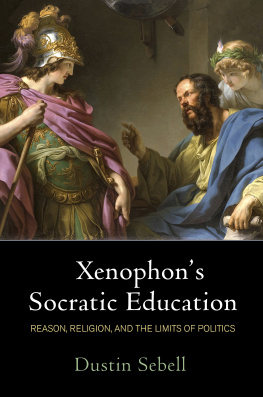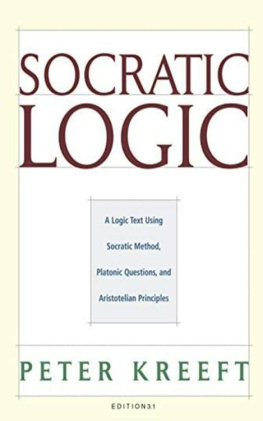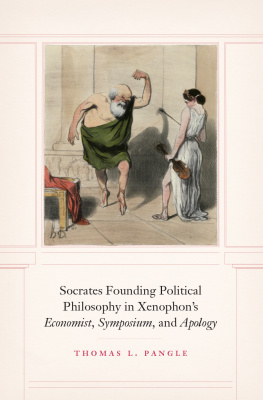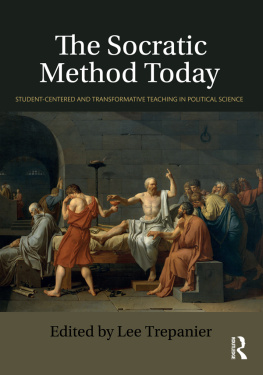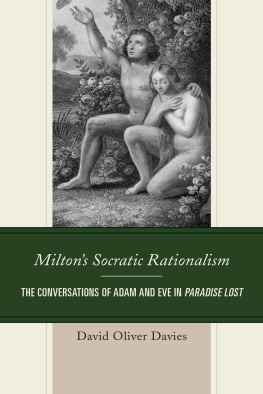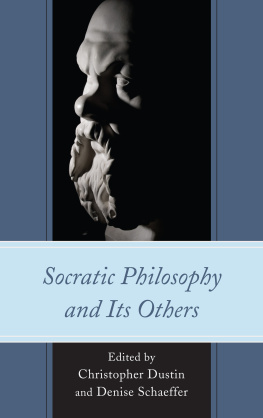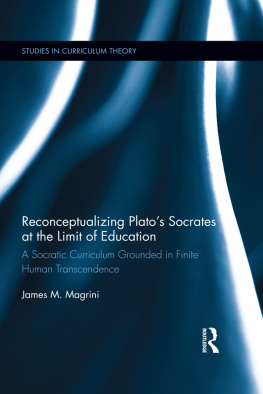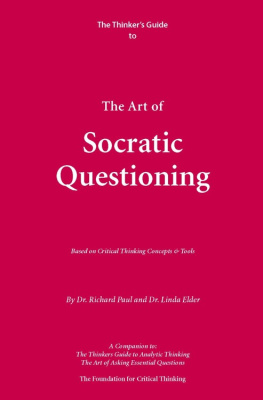Dustin Sebell - Xenophons Socratic Education
Here you can read online Dustin Sebell - Xenophons Socratic Education full text of the book (entire story) in english for free. Download pdf and epub, get meaning, cover and reviews about this ebook. year: 2021, publisher: University of Pennsylvania Press, Inc., genre: Science. Description of the work, (preface) as well as reviews are available. Best literature library LitArk.com created for fans of good reading and offers a wide selection of genres:
Romance novel
Science fiction
Adventure
Detective
Science
History
Home and family
Prose
Art
Politics
Computer
Non-fiction
Religion
Business
Children
Humor
Choose a favorite category and find really read worthwhile books. Enjoy immersion in the world of imagination, feel the emotions of the characters or learn something new for yourself, make an fascinating discovery.
- Book:Xenophons Socratic Education
- Author:
- Publisher:University of Pennsylvania Press, Inc.
- Genre:
- Year:2021
- Rating:4 / 5
- Favourites:Add to favourites
- Your mark:
- 80
- 1
- 2
- 3
- 4
- 5
Xenophons Socratic Education: summary, description and annotation
We offer to read an annotation, description, summary or preface (depends on what the author of the book "Xenophons Socratic Education" wrote himself). If you haven't found the necessary information about the book — write in the comments, we will try to find it.
Xenophons Socratic Education — read online for free the complete book (whole text) full work
Below is the text of the book, divided by pages. System saving the place of the last page read, allows you to conveniently read the book "Xenophons Socratic Education" online for free, without having to search again every time where you left off. Put a bookmark, and you can go to the page where you finished reading at any time.
Font size:
Interval:
Bookmark:


Reason, Religion, and the Limits of Politics
Dustin Sebell

Copyright 2021 University of Pennsylvania Press
All rights reserved. Except for brief quotations used for purposes of review or scholarly citation, none of this book may be reproduced in any form by any means without written permission from the publisher.
Published by
University of Pennsylvania Press
Philadelphia, Pennsylvania 19104-4112
www.upenn.edu/pennpress
Printed in the United States of America on acid-free paper
10987654321
Library of Congress Cataloging-in-Publication Data
Names: Sebell, Dustin, author.
Title: Xenophons Socratic education : reason, religion, and the limits of politics / Dustin Sebell.
Description: 1st edition. | Philadelphia : University of Pennsylvania Press, [2021] | Includes index.
Identifiers: LCCN 2020022844 | ISBN 9780812252859 (hardcover)
Subjects: LCSH: Xenophon. Memorabilia. | Socrates. | Philosophy, Ancient.
Classification: LCC PA4494.M6 S43 2021 | DDC 183/.2dc23
LC record available at https://lccn.loc.gov/2020022844
To my parents


To David Bolotin, who read and made detailed comments on the whole manuscript, I am particularly grateful. But I am also extremely grateful to Christopher Bruell, Eric Buzzetti, David Levy, and the anonymous readers for the University of Pennsylvania Press for their feedback. I am deeply indebted to Damon Linker, my editor, for his guidance and support and to Richard Zinman and Arthur Melzer, my friends and colleagues, for theirs. I want to thank Chuck Ostrom who, as department chair, generously offered me time off to write. And special thanks are due to Bradley Jackson as well. Above all, though, I am grateful to Lauren, my wife, for her help translating French, for all the proofreading that she did, and for the many other waystoo many to countin which she made this book possible.
According to the first sentence of the First Amendment to the Constitution, Congress shall make no law respecting an establishment of religion, or prohibiting the free exercise thereof. But are there not religions that demand, to varying degrees, to be established by law? And what happens, then, when there is a religion whose free exercise is prohibited if it is not established, to one degree or another, by law? There are two, and only two, options: either prohibit the free exercise of the religion (and do not establish it by law) or establish the religion by law (and do not prohibit its free exercise). In such cases, when the supreme law of the land appears to come into contradiction with itself, what are we to do?
If we have to ask, if we have to answer the question only by reasoning from premises shared by all parties to the controversy, we have no choice but to turn to a philosopher for guidance. And no one in living memory is more famous for philosophy than John Rawls. To Rawls, moreover, this very question was a torturing one.
Those who affirm fundamentalist religious doctrines are mad, however, only if they are grievously mistaken about the highest things, not least, salvation and eternal life.
And yet, to counter, in this way, religious fundamentalism with irreligious fundamentalism is to teeter on the brink of madness, if not to descend into it. For to Rawls the reply will be made by those who affirm fundamentalist religious doctrines that it is he, and not they, who should be treated like war and disease. Indeed, as Rawls well knew, Thomas Aquinas had made this reply in advance (Summa Theologica II-II, q.11a.3). And even, or precisely, if Rawls was right to say that the premises on which Aquinas relies cannot be established by modes of reasoning commonly recognized, nothing prevents Aquinas from turning the tables on him. After all, the premises on which [Rawls] relies, first and foremost, that the world is eternal, cannot be established by modes of reasoning commonly recognized either.until such time as war concludes, someday, somewhere, with the triumph of the will. Whose is anyones guess, though, and no ones to judge.
According to Jrgen Habermas, Rawlss tougher or even more complacent, German counterpart, If, then, we cannot bring ourselves to bid farewell to reason, there is nothing for us to do but look elsewhere for guidance. Rawls can, however, point us in the right direction. And he can do so not only, as we saw, by impressing upon us the importance of engaging those whose understanding of self and world conflicts with our own, but also by giving us a clue as to how to do this without begging the question, on the basis of some common ground.
After Rawls passed away, there was found among his papers a brief account of how he lost his faith as a young man, to which he had given the title, On My Religion. And while Rawls begins by saying that the account is not unusual or especially instructive, that is not entirely true. The account is instructive precisely because it is not unusual. Now, by this account, Rawls never understood (although he often wondered) why he lost his faith. The account points therefore to a connection, which is not unusual, between morality or politics and religion. Does the one somehow depend on the other? Abraham debated with God about the justice of destroying Sodom, as if he knew of God that He would not do anything unjust (Genesis 18:16ff.). Of course, Abrahams faith was no simple matter (Genesis 22:110). And perhaps, when all is said and done, there is no discernable connection between morality or politics and religion, much less any dependence of the one upon the other. Still, if we have to answer the question on which our law appears to be divided against itself only by reasoning from premises shared by all parties to the controversy, there is perhaps no better guide than Socrates. For Socrates was the philosopher who did, famously, engage those whose understanding of self and world conflicted with his own. And he did so, what is more, by going out into the marketplace and engaging them in conversation, first and foremost, about morality or politics.
Now, aside from Aristophanes, the writers on whom we depend for whatever knowledge we have of the thought of Socrates are Xenophon, Plato, and Aristotle. But neither Aristotle nor even Plato is more important for our purposes than Xenophon. According to Aristophanes, Socrates did not believe in the gods in whom the city believed, on one hand, and he made the unjust speech stronger than the just speech, on the other (Clouds 9499, 366407, 114854; Plato, Apology 18b4d2, 19b4c3, 23d27). And Xenophon, no less than Plato (Phaedo 96a6100a8), suggests that Aristophanes was not entirely wrong: Socrates was that way, at least in his youth. For there was a time, according to Xenophons indications, when Socrates was infamous as a pre-Socratic natural philosopher, on one hand, and as a rhetorician or sophist, on the other (
Font size:
Interval:
Bookmark:
Similar books «Xenophons Socratic Education»
Look at similar books to Xenophons Socratic Education. We have selected literature similar in name and meaning in the hope of providing readers with more options to find new, interesting, not yet read works.
Discussion, reviews of the book Xenophons Socratic Education and just readers' own opinions. Leave your comments, write what you think about the work, its meaning or the main characters. Specify what exactly you liked and what you didn't like, and why you think so.

